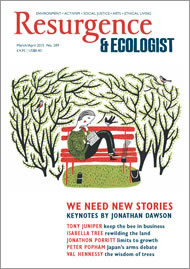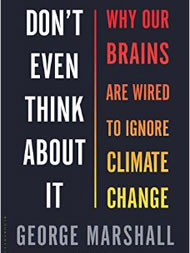It is widely accepted in the scientific community and by politicians that climate change is the biggest threat to the planet and to civilisation as we know it. Yet large sections of the population seem unconcerned by the danger, or, when asked, say they doubt whether global warming is a problem at all.
This lack of interest in the fate of all we hold dear, including the lives of our children and grandchildren, is one of the most perplexing problems of the age. How do we avert this catastrophe if a large proportion of the population, probably the majority, is refusing to accept that it is happening at all or, if they do accept it, will do virtually nothing to avert it?
Don’t Even Think About It sums up in its title an exploration by the author, George Marshall, in more than 250 pages, of the failure of the community at large to deal with the issue. Perhaps more contentious is the subtitle, “Why our brains are wired to ignore climate change.” Marshall argues that human evolution makes us suited to dealing with a charging elephant, but not capable of properly reacting to or preparing for a danger years down the line.
As a journalist covering climate change for nearly 30 years, I have often been perplexed by this phenomenon. Dozens of conferences and hundreds of scientific reports have made it perfectly clear to me that the danger is real and present. As time has passed it has been a constant source of amazement to me that the reaction of the public has been so muted.
Admittedly in the early 1990s climate change seemed a distant threat, yet then the political will to do something about it seemed stronger. As the evidence of climate change has mounted, such that the effects of storms, sea-level rise and human migration are already with us and accelerating, the action to prevent it happening has, if anything, slowed. Politicians have been allowed by the public to make grand speeches about the threat as long as they do not interfere with the lifestyle of the people who are knowingly destroying their own life-support system.
Marshall explores these issues through the eyes of many experts on human behaviour. He also looks at the successful campaigns of the fossil-fuel lobby and the right-wing think tanks funded by free marketeers in undermining the science and creating doubt in the minds of the public. He comes to the conclusion that this success in destroying public trust in science and undermining the will to take any action is aided by human frailties wired into our system during our evolution.
If Marshall is right it is fundamentally depressing that we have in our human make-up the seeds of our own destruction, in that we are unable to take this threat seriously. It does explain, though, why we have been so slow to take action.
Although a committed environmentalist himself, Marshall has taken the time and trouble to interview some of the key global-warming sceptics and explored their mindset. It is interesting how the environment, once a non-partisan issue, has become so politicised. The far right, particularly in America, now regard environmentalists as interfering with their basic freedoms, and in their eyes they have replaced communists as the new enemy.
Having cast gloom in all directions, Marshall offers some solutions. He suggests ways of changing the message to make the threat seem imminent and prompt people to take action, but I was reading this as the Lima climate talks staggered to an unsatisfactory conclusion, so his ideas did not seem to be enough to stem the tide. If the experts interviewed in this book are correct, then we are wired to allow our own destruction, and the fossil-fuel industry is so skilled at undermining the science and the political process that they will make sure we do. Let’s hope the experts are wrong.








